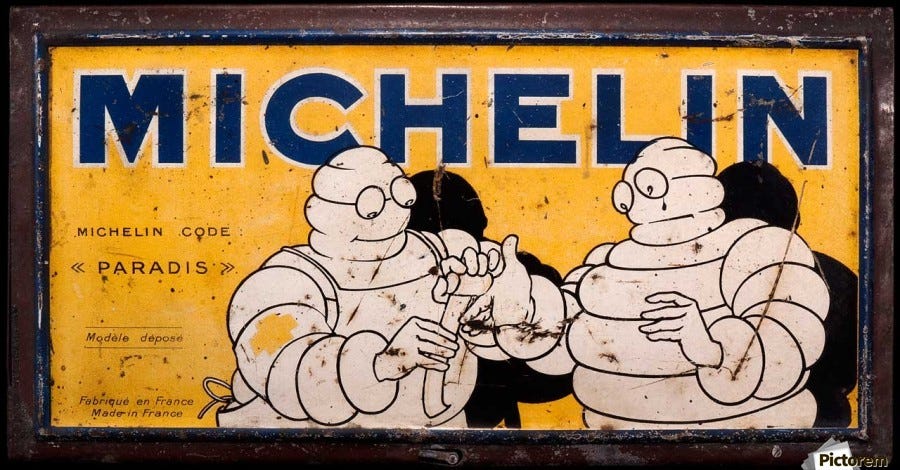Here's What Matters More Than a Michelin Star
Yes, there's one thing that virtually ensures your restaurant remain review-proof
By most standards (or simply any that disregard Tokyo) New York is a city awash in Michelin stars. Still, when a few famous places get stripped of their status, people tend to notice…or do they? We’ll get to that. But first, last month’s list, which saw nine restaurants that had previously been awarded one-star status fall from Michelin’s good graces. Gone were Ai Fiori and Marea, as well as venerated Viennese schnitzel spot Wallsé.
But of all the restaurants that got the Michelin Man’s pillowy boot, none earned more ink than Peter Luger’s and Carbone. Let’s dispense with the obvious first: you don’t go to these two restaurants in search of good food alone. There’s history, hotness, and host of other factors that come into play, none of which are considered by the Guide Michelin’s anonymous inspectors (who judge based on the meal and the meal alone, with consistency — or, in this case, inconsistency — rumored to be the deciding factor behind a demotion). There’s also the fact that, however personal and traumatic the loss of a star can feel — chefs have shed tears, some have even sued — Michelin benedictions no longer carry the weight they once did.
All of which leads to one question: in the modern culinary world — one filled with other prestigious awards; a world that’s broadened from the Eurocentric conception of fine dining that the French guide books so anachronistically still embody — do Michelin stars even matter anymore? HELL NO!! At least not in our opinion. Without getting too granular, consider the NYC restaurants that have either been demoted, dropped from the list, or snubbed altogether over the past six years. You’ll find the likes of Minetta Tavern, La Mercerie, Frenchette, Jean-Georges, Le Coucou, and Lilia gracing this rogues gallery. Have any of these spots lost their luster? Not in the slightest.
We’re sure the same will be said of Luger’s and Carbone. The dry-aged porterhouse at Luger’s will still slice like butter as much as its waiters will retain their surly charm. Carbone’s spicy rigatoni will surely still slap as hard as the luminaries studding its wait list.
Ok, fine. But if Michelin stars don’t matter anymore, what does? Simple, the same thing that always has: regulars. It’s not the loss of a Michelin star that makes or breaks a restaurant, but how that restaurant — or rather, how that restaurant’s clientele — respond to said loss. Will Carbone’s regulars rally around the Michelin maligned joint? Will Luger’s do the same? The true measure of a restaurant’s health, it would seem, isn’t determined by one anonymous critic’s assessment, but rather by the loyalty of its diners.
Look no further than Luger’s for historical precedence. Back in 2019, after Times restaurant critic Pete Wells eviscerated the then 132-year-old steak house with a zero-star review, regulars and tourists alike came out in droves to dine at the beleaguered Brooklyn institution. “This place is great,” a retired NYPD officer told the Daily Mail a day after Wells’ pull-no-punches takedown dropped, and the public’s enthusiasm hasn’t dwindled since.
Of course Luger’s has history on its side, the wood floor and the crumbly burger and even the sometimes rude waiters all able to evoke a sense of nostalgia in its patrons. Carbone, on the other hand, doesn’t evoke nostalgia so much as conjures it with details and swagger harking back to a bygone New York. And yet both restaurants accomplish the same feat: in a city constantly reinventing itself, Luger’s and Carbone anchor their patrons in a world seemingly untouched by time — they make us feel like part of their story, and thus part of the city itself, if only for the course of a meal. By all accounts it’s working — one look at Resy, and we see that Carbone’s dinner reservations are booked out for the rest of the year.
Great restaurants make their customers feel seen, they stitch them right into the fabric, and in so doing they engender a loyalty no bad review or stripping of a star can erode. This symbiosis between restaurant and diner is a state to which all establishments should aspire.
And it’s a relationship that needn’t be the territory of icons and hotspots alone. Every good restaurant should enjoy a closeness with their patrons. Here at Blackbird, we’re busy building products that will facilitate this one-to-one connection between restaurant and guest so that trust and loyalty ensure a longevity no subjective review can sink. Do restaurants still like ratings? Of course they do. Ratings are clean and easy to understand. But — especially in the case of Michelin — they need to be updated so that they more accurately represent the metrics that matter, with the loyalty of regulars being high on the list.
James Jung
VP, Content
Blackbird Labs, Inc.
Thanks for reading! Blackbird will launch in select restaurants later this year. In the meantime, if you dug this, please give it a like! We’re also on Twitter and would love to hear from you there.





100% agree with this take! Regulars are the foundation to many restaurants. More so than reviews.